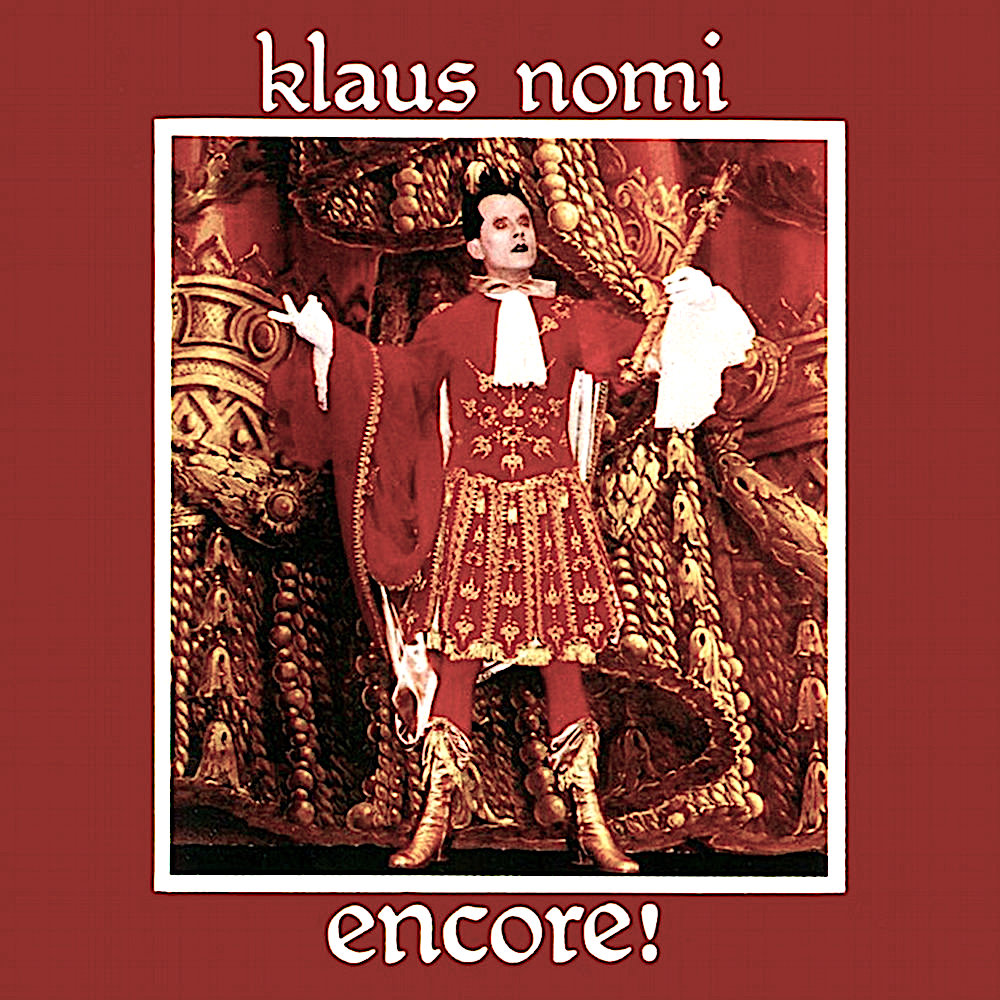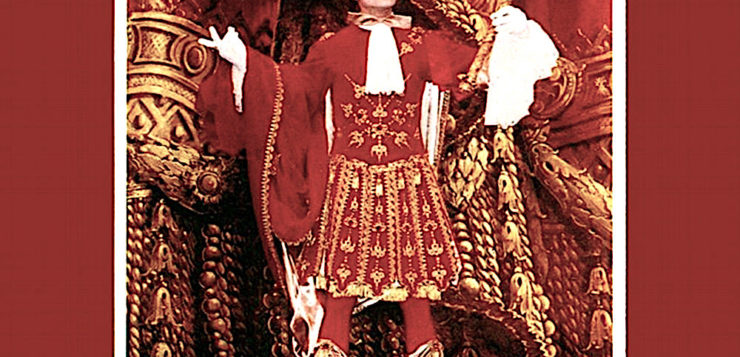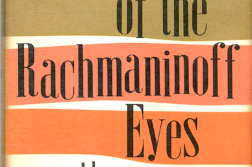HE STEPS stiff-legged into the spotlight, the red and green-gelled lights reflecting off the high neck of his translucent parka making him look like the angel on top of F. W. Murnau’s Christmas tree. His face is painted chalk white, cheekbones contoured in charcoal and gray and hair scraped off his forehead in a stark widow’s peak. When he parts his painted-black lips to sing, the audience falls into a hush. His countertenor is so pure and virtuosic and his approach so sincere that he leaves the jaded New York City audience mesmerized. Then, in a flash of strobe light and a puff of smoke, he is gone.
In the half-decade after his 1978 debut at the New Wave Vaudeville, Klaus Nomi (1944–1983) blazed like a comet over the Lower East Side. He recorded two albums of eclectic dance-pop music, appeared in three feature films, wrote a glam-rock opera, and collaborated with David Bowie on a memorable Saturday Night Live performance. Even after his death, his magnificent voice rang through the ages. Late-night animators and right-wing radio cranks paid him tribute, and new generations have been influenced by his music and his otherworldly æsthetic.
Klaus Nomi’s origin story began in postwar Bavaria. As a teenager, he so idolized Maria Callas that he started training to become an opera singer. He sang in gay nightclubs and entertained his fellow ushers and support staff after performances at the Deutsche Oper Berlin, but opportunities were few for a countertenor in Eastern Europe. After exhausting his other options, Nomi sailed west to find his fortune in New York City.
 While moonlighting as a pastry chef, Nomi appeared in productions with the Ridiculous Theatre Company and began training with drag-friendly vocal coach Ira Siff. In the 2006 documentary The Nomi Song, Siff recalled of his former student: “He really wanted to work the falsetto, and I thought he’d end up brokenhearted because there was no context for using your falsetto voice in those days.”
While moonlighting as a pastry chef, Nomi appeared in productions with the Ridiculous Theatre Company and began training with drag-friendly vocal coach Ira Siff. In the 2006 documentary The Nomi Song, Siff recalled of his former student: “He really wanted to work the falsetto, and I thought he’d end up brokenhearted because there was no context for using your falsetto voice in those days.”
Nomi was looking away from the operatic stage for inspiration. The up-and-coming generation of arty New Yorkers had coalesced around a new club on the Bowery called CBGB. Nomi’s formal training and baroque sensibility might not have much in common with the Ramones’ crude bubblegum pop or the Talking Heads’ angular minimalism, but these and other bands shared a science-fiction surrealist æsthetic and a do-it-yourself approach that resonated with Nomi.
After his fateful performance at the New Wave Vaudeville, Nomi assembled a band of CBGB all-stars, refined his space-alien look, and put together a longer act consisting of original songs and 1950s covers adapted to his Teutonic operatic style. They stole the show at their first gig, and Nomi’s star rose in the East Village scene. He played at trendy nightspots like Danceteria, Hurrah’s, and the Mudd Club, sang in the window at the Fiorucci store, and gave an impromptu cooking lesson on Glenn McDonald’s TV show New York Rock. He and cabaret singer Joey Arias even modeled for a Jagermeister ad campaign. He was so ubiquitous and his talent so undeniable that David Bowie—the king of rock and roll weirdoes—invited Nomi and Arias to appear with him on Saturday Night Live.
Dressed in funereal black vinyl, Nomi comes off in the SNL clips as a character actor who pulls focus from the leading man. His heavily accented English and strong head voice eerily echoed Bowie in the song “The Man Who Sold the World,” and he stabilized the vocal rhythm on “Boys Keep Swinging.” Nomi and Arias had some stage business—they carried Bowie, immobilized by a vinyl tuxedo, onto the stage and sang backup—and their angular dancing and stage presence had viewers asking “Who are these people?”
Before going onstage for their SNL gig, Bowie told Nomi and Arias: “Today is the day your lives will change forever.” He ghosted Nomi after the broadcast, but the high profile of an SNL appearance afforded Nomi some big opportunities. He played a set at the Ritz nightclub that was filmed for the 1983 concert film Urgh! A Music War, and he was later signed to the European arm of RCA, which was then David Bowie’s label. By this time, Nomi’s management had distanced him from his collaborators in the downtown New York scene to pursue what may have seemed like a more commercial approach to music.
The two records Nomi made for RCA are fun for listeners who don’t know much about his earlier work, but the new wave sound and the camp sensibility don’t really mesh. Nomi didn’t have Bowie’s gift of immediacy, and while the songs were whimsical, you had to buy into his over-the-top persona to fully appreciate his music. Perhaps these kinks would have been ironed out in later albums, but Nomi wouldn’t have the chance. On the promotional tour for Simple Man, he complained of frequent exhaustion. Instead of his space-alien tuxedo, he started wearing a Renaissance opera costume with a ruff to hide the Kaposi’s sarcoma lesions on his neck. When he returned to Manhattan, he was diagnosed with a disease that would come to be named AIDS.
“He began to look like a monster: his eyes were just purple slits, he was covered in spots and his body was totally wasted,” Joey Arias recalled to Attitude magazine in 1999. “I had a dream that he’d recover his strength and go back on stage, but that he’d have to veil himself like the Phantom of the Opera. He laughed, he liked that idea, and he actually seemed to be getting better for a while. That was on a Friday night. I was going to go and see him again on the Saturday morning, but they called me and told me that Klaus had passed away in the night.”
While Nomi’s voice was eternally silenced in August 1983, his influence echoed through the ensuing decades. Andrew Horn’s 2004 documentary The Nomi Song brought a new wave of Nomi-mania to the U.S., and a new generation of musicians, like Mike Hadreas of Perfume Genius, Heloise Lessiter of Christine and the Queens, and Anohni, have cited him as an influence.
“I just tried to think of him as this alien presence who had come to earth to unite these people that were kind of like fashion victims and disco outcasts,” bandleader Kristian Hoffman said in The Nomi Song, “and make them be sort of like the foam that was going to rise to the surface of humanity if they joined forces.” Though his time on earth was short, Nomi is still bringing outsider artists together today.
Chelsea Spear is a freelance film critic and writer based in Boston.





